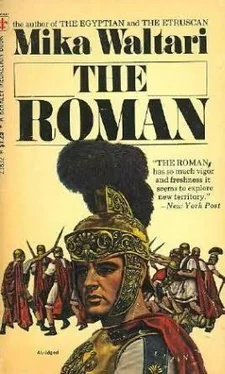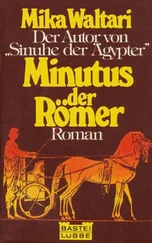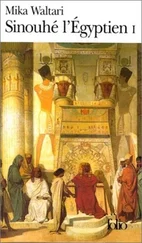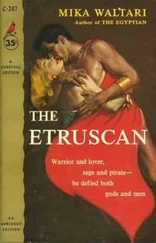Mika Waltari - The Roman
Здесь есть возможность читать онлайн «Mika Waltari - The Roman» весь текст электронной книги совершенно бесплатно (целиком полную версию без сокращений). В некоторых случаях можно слушать аудио, скачать через торрент в формате fb2 и присутствует краткое содержание. Жанр: Исторические приключения, на английском языке. Описание произведения, (предисловие) а так же отзывы посетителей доступны на портале библиотеки ЛибКат.
- Название:The Roman
- Автор:
- Жанр:
- Год:неизвестен
- ISBN:нет данных
- Рейтинг книги:4 / 5. Голосов: 1
-
Избранное:Добавить в избранное
- Отзывы:
-
Ваша оценка:
- 80
- 1
- 2
- 3
- 4
- 5
The Roman: краткое содержание, описание и аннотация
Предлагаем к чтению аннотацию, описание, краткое содержание или предисловие (зависит от того, что написал сам автор книги «The Roman»). Если вы не нашли необходимую информацию о книге — напишите в комментариях, мы постараемся отыскать её.
The Roman — читать онлайн бесплатно полную книгу (весь текст) целиком
Ниже представлен текст книги, разбитый по страницам. Система сохранения места последней прочитанной страницы, позволяет с удобством читать онлайн бесплатно книгу «The Roman», без необходимости каждый раз заново искать на чём Вы остановились. Поставьте закладку, и сможете в любой момент перейти на страницу, на которой закончили чтение.
Интервал:
Закладка:
Without looking at her, I began to walk homeward. She hesitated for a moment and then slowly followed me and we said nothing to each other for a while. But in the end I had to burst out laughing. It was pleasant that she came with me so humbly.
She made the most of the opportunity and put her hand on my shoulder.
“Promise me one more thing, Minutus dear,” she begged. “Don’t go straight to a brothel or to make an offering to Venus, as most boys do as soon as they receive their togas. If you feel an irresistible desire for something like that, for I know men are ungovernable, then promise to tell me first, even if it hurts me.”
I promised her all this as she asked me so persuasively. All I was thinking of was what kind of horse I should get. At that time not even Cleopatra could have competed with a good horse in my mind. I laughed when I gave my word and told her she was a nice but rather peculiar girl. We parted smiling and good friends. I was in a good mood afterward. When I got home, my father was just getting into Tullia’s sedan to accompany her home, for she lived at Viminalis on the other side of the city, on the boundary between Altasemita and Esquilina. My father’s eyes were staring and glassy and he did not ask me where I had been, but just told me to go to bed in good time. I suspected that he had drunk a good deal of wine but it was not noticeable from his walk.
I slept soundly and long, but was very disappointed when my father was not at home in the morning. I had hoped we could go straight to the stables to choose a horse for me. The house was being cleaned after the feast and Aunt Laelia complained of a headache. I asked where my father had gone so early.
“Your father is old enough to know what he’s doing,” she replied angrily. “He had a great deal to discuss with his erstwhile friend. Perhaps he stayed the night at Tullia’s house. She has room for more men than him.”
Barbus and I whiled away the time by playing dice in the bushes in the garden while the cleaners set about the house indoors with their brooms and buckets. Spring was in the air. At last my father returned at midday, unshaven, his eyes wild and bloodshot. He had covered his face with a fold of his toga and there was a lawyer with him carrying scrolls of paper and writing materials. Barbus gave me a nudge as a sign that it would be wiser to keep quiet.
My father, in contrast to his usual behavior, kicked over the cleaners’ buckets and ordered the slaves to vanish from his sight with all speed. After hastily consulting the lawyer, he called me in. Aunt Laelia was weeping copiously and I hardly dared stammer out a question to my father about whether he now had time to come with me to choose a horse.
“You and your horse will drive me mad,” he exclaimed. His face was twisted with rage and when one looked at him, it was easy to realize that in his youth he had gone about for years in a state of mental confusion. But he soon regretted his rage.
“No, no, it’s all my own fault,” he said. “It’s my own weakness that has driven me into this state. A stroke of ill fortune has changed all my plans. Now I must go back to Antioch without a moment’s delay. So I have allotted to you the income from some of my estates in Caere and my properties here in the city. It will give you more than the annual income of a thousand sesterces required of a knight. Aunt Laelia will have to look after the house. It can be your home. I have also allotted an annuity to Aunt Laelia. And it’s nothing to cry about. My lawyer will be your guardian. He is of an old noble family. You can go and choose a horse together at once if you want to, but I must return to Antioch immediately.”
My father was so confused that he was about to rush out on to the street at once to set off on his journey, but the lawyer and Aunt Laelia restrained him. They arranged for his luggage and clothes and food, although he said impatiently that he could hire a wagon at the city gates and go to Puteoli and buy everything he wanted on the way. Suddenly chaos reigned in our house after the cheerful festivities of the previous day. We could not let him go away like an exile, the corner of his mantle hiding his face. So we all went with him, Aunt Laelia, the lawyer, Barbus and I. Last came the slaves carrying his hurriedly packed belongings.
When my father reached the Capua gate below Coelius, he let out a deep sigh of relief and began to bid us all farewell, saying that he could already see golden freedom looming ahead of him on the other side of the gate and that he should never have left Antioch. But at the gate, one of the city magistrates came up to us with his official stave in his hand and two powerful policemen behind him.
“Are you the Roman knight, Marcus Mezentius Manilianus?” he asked my father. “If you are, then there is a lady of high position who has important business with you.”
At first my father turned scarlet and then ashen gray in the face. He looked down at the ground, said that he had nothing to say to any lady, and then tried to leave through the city gates.
“If you try to go outside the walls,” the magistrate warned him, “I am ordered to bring you before the City Prefect and it is my duty to arrest you to prevent you from escaping.”
The lawyer hurried up* to my father, asking the magistrate to disperse the crowd that had already gathered, and also asking what my father was accused of.
“It is a simple and discreditable story,” explained the magistrate. “I should prefer to see those involved settle it between them. The noble senator’s widow Valeria Tullia insists that last night Manilianus, in the presence of witnesses, de jure promised her marriage and afterward de facto slept with her. When she for some reason or other doubted Manilianus’ honorable intentions, she had this Manilianus followed by her slave after he had run from her house without bidding her farewell. When the widow Tullia became convinced that he intended to flee, she turned to the Prefect. If Manilianus removes himself beyond the city wall, he will be charged with breach of promise, rape, and also for the theft of a valuable necklace belonging to widow Tullia, which is presumably more ignominious for a knight than a breach of promise.”
My father fumbled at his throat with stiff fingers, pulled out a gold necklace of different colored stones and then said in a broken voice, “Widow Tullia put this cursed necklace around my neck with her own hands. In my haste I forgot to return it to her. Matters of great importance force me to return to Antioch. Naturally I shall give the necklace back to her and stand whatever security you wish, but I must leave here immediately.”
The magistrate was ashamed on behalf of my father.
“Didn’t you in fact exchange necklaces with each other,” he asked, “to confirm your betrothal and marriage promise?”
“I was drunk and did not know what I was doing,” protested my father.
But the magistrate did not believe him.
“On the contrary,” he said, “you appealed verbosely to a number of examples according to which philosophers have been able to enter into a genuine and legal marriage simply by giving a promise in the presence of witnesses. This is what I have been told. Do I understand that in a drunken state, you have made fun of an honorable woman and induced her into bed with you? In which case what you have done is even worse. I am giving you an opportunity to come to some agreement, but if you go through that gate, I shall have you imprisoned and your case will be settled in court instead.”
At least the lawyer managed to persuade my father to hold his tongue and also promised to accompany him to Valeria Tullia’s house to talk the matter over. Exhausted and confused, my father broke down and wept.
Читать дальшеИнтервал:
Закладка:
Похожие книги на «The Roman»
Представляем Вашему вниманию похожие книги на «The Roman» списком для выбора. Мы отобрали схожую по названию и смыслу литературу в надежде предоставить читателям больше вариантов отыскать новые, интересные, ещё непрочитанные произведения.
Обсуждение, отзывы о книге «The Roman» и просто собственные мнения читателей. Оставьте ваши комментарии, напишите, что Вы думаете о произведении, его смысле или главных героях. Укажите что конкретно понравилось, а что нет, и почему Вы так считаете.











